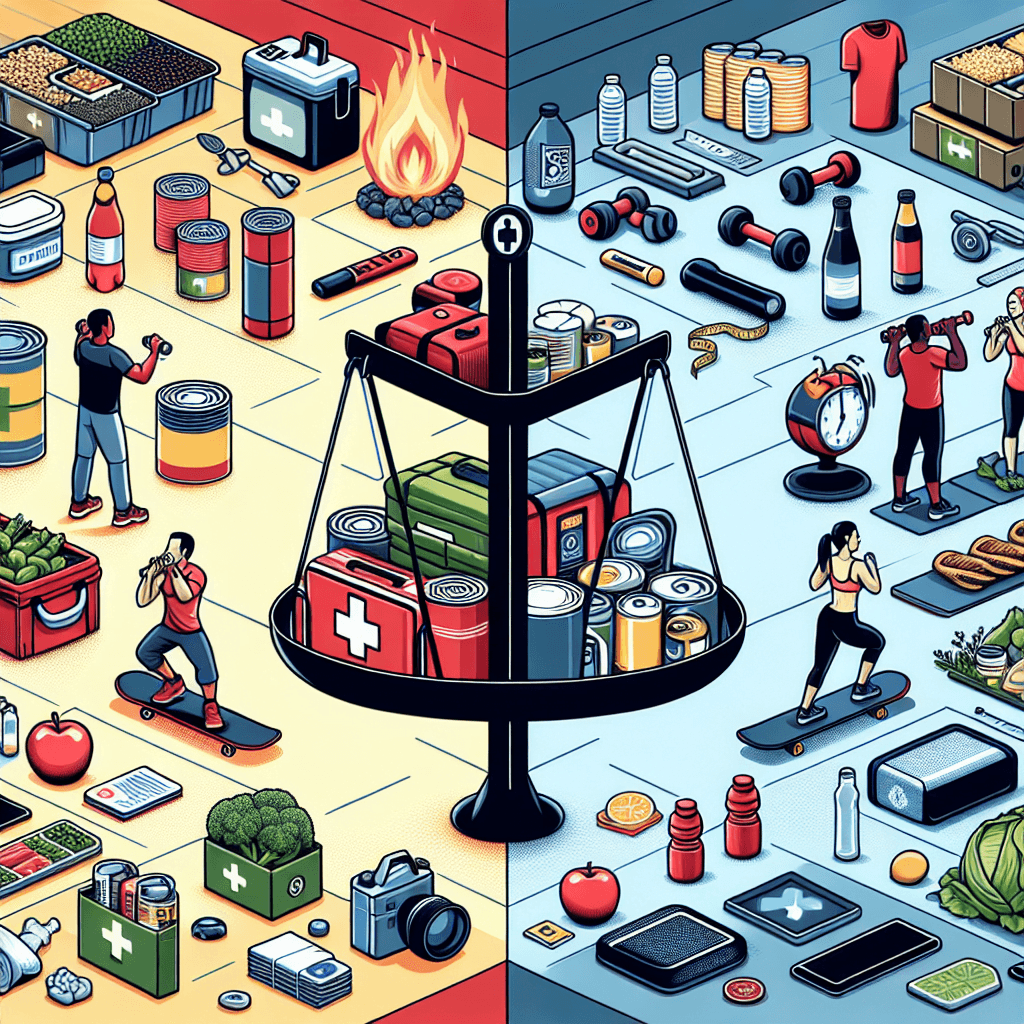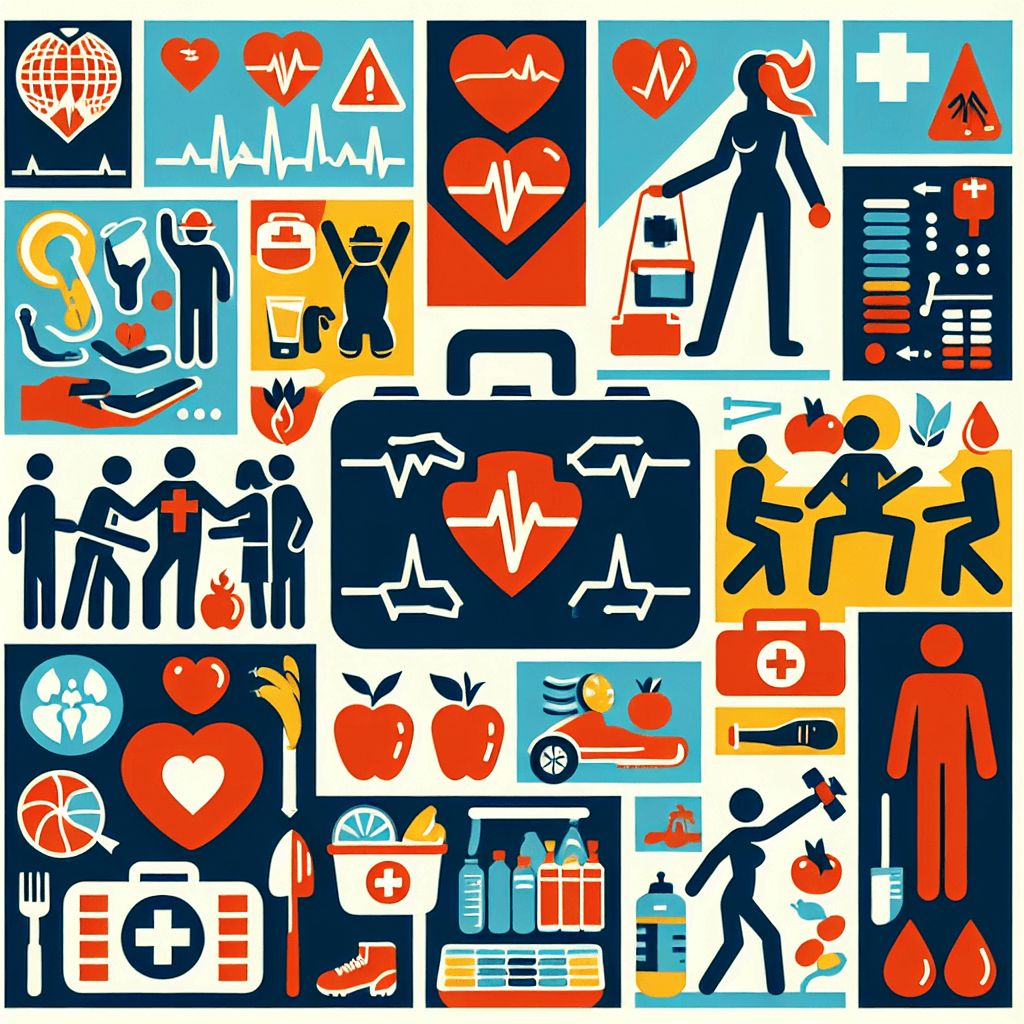In today’s unpredictable world, it is crucial to equip yourself with the necessary knowledge to safeguard your health during times of disaster. “Preparing Your Health for Disaster: What You Need to Know” delves into the importance of being prepared and highlights key considerations to keep in mind. From understanding potential health risks to creating a comprehensive emergency plan, this article serves as a vital resource to help you navigate through the uncertainties and protect both your physical and mental well-being.
Table of Contents
Emergency Preparedness
Creating a Disaster Plan
When it comes to emergency preparedness, creating a disaster plan is crucial. Start by assessing the potential risks in your area. Consider natural disasters such as earthquakes, hurricanes, floods, or wildfires, as well as human-made disasters like chemical spills or terrorist attacks. Identify safe areas in your home and develop an evacuation plan. Have important contact numbers readily available and establish a communication plan with your family or household members. Regularly review and practice your disaster plan to ensure everyone knows what to do in case of an emergency.
Assembling a Disaster Kit
In the event of a disaster, having an emergency kit ready can make a significant difference in your safety and well-being. Your disaster kit should include essential items such as non-perishable food, water, medications, a first aid kit, flashlights, batteries, a battery-powered radio, blankets, and personal hygiene items. Make sure to store your kit in a designated place that is easily accessible to everyone in your household. Check the contents of your disaster kit regularly, ensuring that everything is up to date and in good condition.
Getting Informed about Potential Disasters
Staying informed about potential disasters is key to being prepared. Familiarize yourself with the types of disasters that can affect your area and understand the warning signs associated with each. Sign up for local emergency alerts and notifications through your community’s emergency response system. Stay connected to reliable sources of information, such as the National Weather Service or local government agencies. Be proactive in seeking information and updates, especially during times of heightened risk or when severe weather events are forecasted.
Maintaining a Healthy Lifestyle
Eating a Nutritious Diet
Maintaining a healthy diet is essential for overall well-being, including during times of emergency. Aim to consume a variety of nutrient-rich foods, including fruits, vegetables, whole grains, lean proteins, and healthy fats. Try to limit your intake of processed foods, sugary snacks, and beverages high in calories and low in nutritional value. When stocking your emergency food supply, choose non-perishable items that provide essential nutrients. Canned fruits and vegetables, whole-grain crackers, nuts, and dried fruits can be nutritious options that have a long shelf life.
Staying Physically Active
Regular physical activity is crucial for maintaining good health and managing stress levels, both in everyday life and during emergencies. Find ways to stay active, even in confined spaces or limited circumstances. Engage in activities such as stretching exercises, yoga, calisthenics, or dancing. If it is safe to do so, go for walks or engage in outdoor activities that adhere to any relevant guidelines or restrictions. Physical activity not only promotes physical health but also has positive effects on mental well-being and can help manage stress during challenging times.
Getting Adequate Sleep
Sleep plays a vital role in maintaining overall health and well-being. It helps regulate mood, cognitive function, and immune system function. During emergencies, stress and anxiety levels may be higher, making it challenging to get a good night’s sleep. Establish a regular sleep routine, aiming for at least 7-9 hours of quality sleep per night. Create a relaxing sleep environment by minimizing noise, light, and distractions. Practice relaxation techniques, such as deep breathing or meditation, to help calm the mind before bedtime. Adequate sleep will support your physical and mental resilience during times of crisis.

Medical Preparedness
Regular Check-Ups and Vaccinations
Prioritizing regular check-ups and vaccinations is essential for maintaining good health and preparedness. Schedule routine visits with your healthcare provider to monitor your overall health and address any underlying medical conditions. Stay up to date with recommended vaccinations, as they play a crucial role in preventing infectious diseases. Discuss with your healthcare provider the specific vaccines that are appropriate for you based on your age, health status, and potential exposure risks.
Managing Chronic Conditions
If you have a chronic condition, it is vital to manage it effectively to ensure optimal health and well-being during emergencies. Follow your healthcare provider’s recommendations for medication adherence, lifestyle modifications, and regular monitoring. Have a sufficient supply of necessary medications, medical equipment, and supplies on hand to last through a potential crisis. Keep a record of your medical information, including diagnoses, medications, allergies, and contact information for your healthcare provider. During emergencies, continuity of care becomes crucial in managing chronic conditions effectively.
Stocking Essential Medications
When preparing for a disaster, don’t forget to stock up on essential medications. Ensure you have an adequate supply of prescription medications, over-the-counter medications, and any necessary medical supplies. Keep track of expiration dates and regularly rotate your stock, so the medications remain fresh and effective. It is also advisable to have a written list of your medications, including dosage instructions, in case you need to seek medical attention during an emergency. Consult your healthcare provider and pharmacist for guidance on storing and managing your medications properly.
Mental Health and Emotional Well-being
Building Resilience
Building resilience is essential in coping with stress and adversity during emergencies. Resilience refers to the ability to bounce back and adapt in the face of difficult circumstances. Develop strategies to enhance your resilience, such as maintaining a positive outlook, nurturing supportive relationships, setting realistic goals, and practicing self-care. Engage in activities that promote relaxation and self-reflection, such as mindfulness exercises or journaling. Remember that resilience is a skill that can be cultivated, and by strengthening your resilience, you can better navigate challenging situations and protect your mental well-being.
Seeking Social Support
During times of crisis, seeking social support is crucial for maintaining good mental health. Reach out to family, friends, or support groups for emotional support and connection. Share your concerns and feelings with trusted individuals who can provide a listening ear and reassurance. Participate in virtual or community support networks, where you can find resources and encouragement. By connecting with others, you can alleviate feelings of isolation and gain strength from shared experiences.
Identifying Coping Strategies
Developing effective coping strategies can help you manage stress and maintain your emotional well-being during emergencies. Identify healthy coping mechanisms that work for you, such as engaging in hobbies, practicing relaxation techniques, or engaging in physical activity. Limit your exposure to distressing news or social media, as excessive exposure can contribute to heightened anxiety. Consider seeking professional help if you feel overwhelmed or if your usual coping mechanisms are not effective. Mental healthcare professionals can provide guidance, support, and coping strategies tailored to your individual needs.

First Aid and Basic Medical Skills
Identifying Common Medical Emergencies
Having the knowledge to identify common medical emergencies can make a significant difference in providing timely and appropriate assistance. Educate yourself on signs and symptoms of conditions like heart attacks, strokes, choking, allergic reactions, or severe bleeding. Understanding key indicators can help you assess the situation quickly and determine the appropriate course of action. Familiarize yourself with emergency protocols and techniques, such as the recovery position, CPR, or the Heimlich maneuver. Consider enrolling in a first aid or CPR course to gain practical skills and enhance your preparedness.
Learning First Aid Techniques
Equipping yourself with first aid techniques can be invaluable in emergency situations. Learn essential skills such as wound care, bandaging, splinting, and how to respond to burns or fractures. Understand when and how to administer basic medical treatments, such as applying pressure to stop bleeding or performing CPR. Practice these techniques under professional guidance to ensure your readiness and confidence in providing assistance when needed. Regularly reviewing and refreshing your knowledge and skills will ensure their effectiveness in critical moments.
Administering CPR and AED
Cardiopulmonary resuscitation (CPR) and automated external defibrillator (AED) use are life-saving skills that can make a significant impact during emergencies. Knowing how to perform CPR and operate an AED can help maintain blood circulation and restore normal heart rhythms in case of cardiac arrest. Familiarize yourself with the proper techniques for administering CPR, including chest compressions and rescue breaths, and understand the guidelines for using an AED. Remember, proper training and certification are crucial, as incorrect CPR or AED use can be harmful. Seek certified training courses to acquire the necessary skills and knowledge.
Protecting against Infectious Diseases
Proper Hand Hygiene
Practicing proper hand hygiene is a fundamental method of protecting yourself and others from infectious diseases. Wash your hands thoroughly with soap and water for at least 20 seconds, especially before eating, after using the restroom, or after coughing/sneezing. If soap and water are not available, use hand sanitizer with at least 60% alcohol content. Avoid touching your face, nose, and mouth with unwashed hands, as this can introduce pathogens into your body. By practicing good hand hygiene, you reduce the risk of spreading infectious diseases and promote a safer environment for yourself and those around you.
Immunizations and Vaccines
Immunizations and vaccines are critical tools in preventing the spread of infectious diseases. Stay up to date with recommended vaccinations and ensure that you receive all necessary booster shots. Vaccination not only protects your health but also helps maintain community immunity, reducing the overall risk of disease outbreaks. Consult with your healthcare provider to determine which immunizations and vaccines are appropriate based on your age, health status, and potential exposure risks.
Personal Protective Equipment
During emergencies, using personal protective equipment (PPE) can reduce the risk of exposure to infectious diseases. Depending on the situation, appropriate PPE may include items such as face masks, gloves, goggles, or face shields. Familiarize yourself with the proper use of PPE, including how to wear, remove, and dispose of it safely. Follow guidelines provided by public health authorities or healthcare professionals to ensure proper protection. Remember that PPE should be used in conjunction with other preventive measures, such as hand hygiene and social distancing, for maximum effectiveness.

Ensuring Safe Water and Sanitation
Water Storage and Purification
Ensuring a safe and adequate water supply is crucial during emergencies. Store an ample supply of safe drinking water for each member of your household, considering a minimum of one gallon per person per day for at least three days. Store water in clean, airtight containers and keep them in a cool, dark place to maintain quality and prevent contamination. If you need to find additional water sources during emergencies, be knowledgeable about proper water purification methods using filters, boiling, or water purification tablets. Clean water is essential for hydration, cooking, and maintaining proper hygiene.
Food Safety Practices
Maintaining food safety practices during emergencies is vital to prevent foodborne illnesses. Store non-perishable food items in proper containers, ensuring protection against pests, moisture, and temperature fluctuations. Follow expiration dates and rotate your stock regularly to consume the oldest items first. If the power goes out, keep refrigerator and freezer doors closed to maintain proper temperatures as long as possible. When in doubt, throw out perishable foods that have been stored at unsafe temperatures or that have an unusual odor, texture, or appearance. Safe food practices will ensure your health and minimize the risk of foodborne illnesses.
Sanitation and Hygiene Measures
Maintaining proper sanitation and hygiene practices is crucial for preventing the spread of diseases, especially in emergency situations. Keep your surroundings clean and free of debris or standing water that can attract pests or harbor bacteria. Practice regular hand hygiene, as mentioned earlier, and encourage others to do the same. Use proper sanitizing methods for surfaces, utensils, and food preparation areas. Have a sufficient supply of personal hygiene items, such as soap, toilet paper, feminine hygiene products, and diapers, if applicable. By prioritizing sanitation and hygiene, you can mitigate the risk of illness and promote a healthier environment.
Understanding Medical Resources in Emergencies
Local Emergency Medical Services
Familiarize yourself with the local emergency medical services available in your area. Determine the appropriate emergency phone number or hotline to use in case of medical emergencies. Understand the response times, services provided, and any special instructions or protocols for seeking medical help during emergencies. Knowing where to go and what to expect can facilitate a more efficient response and ensure timely access to healthcare resources when needed most.
Accessible Healthcare Facilities
Identify accessible healthcare facilities in your area during emergencies. Know the locations of hospitals, urgent care centers, or clinics that may provide medical assistance during crises. Understand the limitations and services offered by each facility to determine the most appropriate option for your healthcare needs. Keep a list of contact information and addresses for these facilities readily available, ensuring you can quickly access medical care if required.
Emergency Hotlines
Be aware of emergency hotlines or helplines available in your area. These hotlines can provide valuable information, guidance, and assistance during emergencies. Save relevant hotline numbers in your phone or keep them in a visible location so you can access them easily. During critical situations, emergency hotlines can provide immediate support, answer questions, and direct you to necessary resources. Take note of any special instructions or protocols provided by these hotlines to ensure you are well-informed and prepared to seek help when needed.

Special Considerations for Vulnerable Populations
Infants and Children
When preparing for emergencies, special attention should be given to the needs of infants and children. Have an adequate supply of formula, baby food, diapers, and other essential supplies. Create a safe space for infants and young children, considering their unique needs for comfort and interaction. Identify potential hazards in your home and take preventive measures to ensure child safety. Establish a communication plan with your child’s school or daycare, understanding their emergency protocols and notification systems. Consider any specific medical or emotional needs your child may have during emergencies and consult with their healthcare provider for guidance.
Pregnant Women
Pregnant women require additional considerations and preparations during emergencies. Keep a record of prenatal information, including due dates, medical history, and contact information for your healthcare provider. Ensure you have an adequate supply of prenatal vitamins and any necessary medications. Prepare a birth plan and discuss it with your healthcare provider, understanding any potential contingencies during emergencies. Arrange transportation options to healthcare facilities in case of labor or related emergencies. Stay informed about potential risks to pregnant women during different types of disasters and follow guidelines provided by reputable sources.
Elderly and Disabled Individuals
Elderly and disabled individuals may face unique challenges during emergencies, requiring additional planning and support. Develop a support network that includes family, friends, or neighbors who can check on and assist elderly or disabled individuals in case of emergencies. Ensure mobility aids, assistive devices, and necessary medical supplies are readily available. Make arrangements for any essential services, such as medication delivery or healthcare visits, to continue during emergencies. Create a personal emergency plan that addresses specific needs and limitations, considering access to transportation, communication, and medical care. Consult with healthcare providers or community organizations for guidance on best practices for elderly and disabled individuals during crises.
Psychological First Aid
Providing Emotional Support
Psychological first aid involves providing emotional support to individuals experiencing distress or traumatic events. Be prepared to offer reassurance, comfort, and empathy to those who may be emotionally impacted by emergencies. Listen actively and non-judgmentally, allowing individuals to express their feelings and concerns. Provide information, when appropriate, about available resources and coping strategies. Encourage self-care activities and healthy emotional expression to aid in the recovery process. Recognize your own limits in providing support and refer individuals to professional help if needed.
Active Listening and Empathy
Active listening and empathy are crucial skills in providing psychological first aid. Listen attentively to the person’s feelings, thoughts, and experiences, rephrasing or paraphrasing to demonstrate understanding. Show empathy by acknowledging their emotions and validating their experiences. Avoid minimizing or dismissing their feelings, as this can hinder the healing process. Establish a safe and non-judgmental environment in which individuals feel comfortable expressing themselves. Remember that everyone’s response to an emergency is unique, and offering sincere empathy can make a significant difference in their recovery.
Referrals to Professional Help
Recognize when an individual may benefit from professional help and refer them to appropriate resources. Understand the signs of intense distress or symptoms of mental health conditions that may require specialized assistance. Local mental health organizations, counseling services, or crisis helplines can provide necessary support and guidance. Provide individuals with information about these resources and help them reach out to professionals who can provide the expertise needed for their specific circumstances. Collaboration between psychological first aid providers and mental health professionals ensures comprehensive support for those affected by emergencies.
In conclusion, emergency preparedness is a multifaceted endeavor that requires attention to various aspects of health and well-being. By creating a disaster plan, assembling a disaster kit, and getting informed about potential disasters, you can better protect yourself and your loved ones during emergencies. Maintaining a healthy lifestyle, prioritizing medical preparedness, and ensuring mental health and emotional well-being are also crucial in supporting your overall resilience. Additionally, acquiring first aid and basic medical skills, protecting against infectious diseases, ensuring safe water and sanitation, and understanding available medical resources contribute to comprehensive emergency preparedness. Finally, special considerations for vulnerable populations and knowledge of psychological first aid techniques are vital in addressing specific needs and providing essential support during times of crisis. By following these guidelines and being proactive in your preparedness efforts, you can enhance your health and resilience in the face of emergencies.

The Psychological Impact Of Natural Disasters And How To Cope

